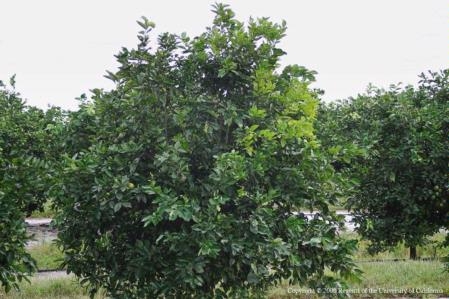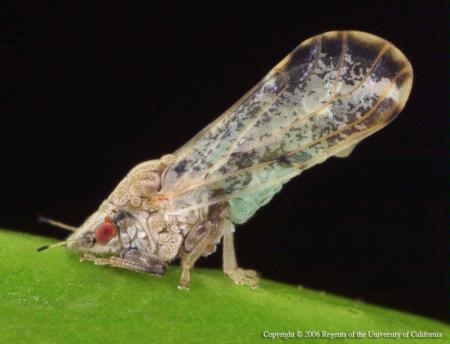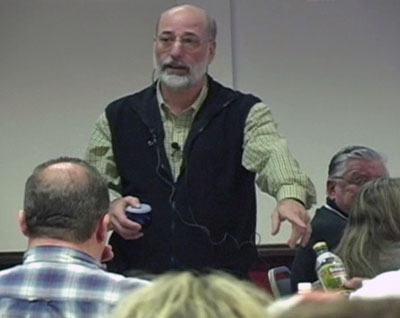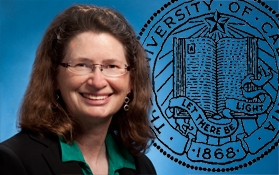Posts Tagged: huanglongbing
HLB still in the news
Douglas M. Main wrote about the detection of huanglongbing disease in Southern California in the New York Times Green Blog.
The greatest immediate threat may be to the homeowners of Los Angeles County, 60 percent of who have a citrus tree in their yard, said Elizabeth Grafton-Cardwell, UC Cooperative Extension specialist and research entomologist in the Department of Entomology at UC Riverside and director of Lindcove Research & Extension Center.
The citrus greening bacteria probably spread from the cutting of budwood illegally brought in from outside the country, the article says Grafton-Cardwell said.
HLB detected in LA area
The dreaded Huanglongbing, a devastating citrus disease, was detected in a Los Angeles County neighborhood last week, reported Diana Marcum and Rosanna Xia in the Los Angeles Times. It is the first confirmed case of the disease in California.
Asian citrus psyllid, which can spread the bacteria that cause the disease, is already infesting Southern California. Rachael Myrow of the California Report blogged about interviewing Mark Hoddle, UC Cooperative Extension specialist in the Department of Entomology at UC Riverside, in January about his efforts to fight the psyllid by releasing Punjabi wasps.
Beth Grafton-Cardwell, UC Cooperative Extension specialist based at UC Riverside and director of the Lindcove Research & Extension Center, has been educating backyard gardeners and commercial growers how to identify and control the insect.
Florida citrus growers explore olive opportunities
Citrus growers in Florida, who are struggling with the devastating citrus disease huanglongbing, are considering growing olives, according to a report on the Tampa, Fla., ABC news affiliate.
Reporter Ryan Raiche covered a meeting at the University of Florida Citrus Research and Extension Center where UC Cooperative Extension farm advisor Paul Vossen introduced growers to olive production and marketing and offered citrus growers the opportunity to taste a variety of olives and olive oils.
“This is not a slam dunk, because this is a really peculiar crop that needs really specific things in order to flower and fruit,” Vossen said.
Olives thrive in a dry climate where it’s not too hot and not too cold. Vossen said rain during bloom season could wipe out the crop.
Ojai man appointed to Regional Water Quality Control Board
Ventura County Star
Gov. Jerry Brown has appointed Ventura County UC Cooperative Extension director emeritus Larry Yee to the Los Angeles Regional Water Quality Control Board.
The board oversees water quality issues and has the power to fine polluters.
Yee worked for the UC Cooperative Extension from 1975 to 2008 and was the Ventura County director from 1986 to 2008. He also was director of the UC Hansen Trust, which was set up to promote agricultural research and education.
UC ANR's vice president opens the door for input
UC Agriculture and Natural Resources is soliciting input from Californians as the organization - which seeks and disseminates solutions to critical problems facing agriculture, natural resources and youth development - wrestles with budget reductions, wrote UC ANR vice president Barbara Allen-Diaz in a commentary published today in AgAlert.
"I look forward to working with you and to hearing your ideas on priorities for research innovations, priorities in your area that need science-based solutions, and ideas on strengthening our partnership in the years to come," Allen-Diaz wrote.
Allen-Diaz said UC ANR is concerned about the impact of recent budget reductions on the number of UC ANR specialists and advisors, which is currently at its lowest number in more than 60 years.
"We are also challenged by our aging work force," she said. "We expect half of our current specialists and advisors to retire in the next six to eight years. We are carefully planning for replacing these positions, and determining the specialties and locations to best serve the needs of California. This planning must be informed by our various clienteles."
New tool to fight Asian citrus psyllid
Redlands Daily Facts
Amid dire predictions for the regional citrus industry, researchers are using another weapon: a natural enemy from the Punjab called Tamarixia radiata.
"The Asian citrus psyllid is about 1/8 inch long, and this wasp is even smaller," said Tom Shea, UC Cooperative Extension staff research associate.
Shea estimated that one female wasp may kill 300 Asian citrus psyllid nymphs in her lifetime. The psyllid itself is not a serious problem, he said, but it is a carrier for Huanlongbing, a citrus disease which has ruined much of the citrus industry in Florida. HLB has been discovered in five states, including a recent discovery in Texas. To date it has not been found in California.
Asian citrus psyllid found in Ventura County
For the first time, an Asian citrus psyllid has been found in Ventura County, according to a news release distributed yesterday by the California Department of Food and Agriculture.
The detection will trigger a quarantine, the agency said. No host nursery stock may be moved out of the area and all citrus fruit must be cleaned of leaves and stems before it is shipped to market.
The psyllid was found Dec. 16 in the La Conchita area in the northern part of the county, reported The Packer. The pest was in a trap in a small citrus grove at least 20 miles from the closest major commercial groves.
The discovery of the destructive bug has rattled the agricultural community, according to an article in the Ventura County Star. The county ag commissioner reported that the county’s citrus industry had revenues of $145 million in 2009. Lemons, grown on 17,703 acres, are the main citrus crop, valued at nearly $130 million.
Asian citrus psyllid is of grave concern because it can carry the disease huanglongbing (HLB). All citrus and closely related species are susceptible hosts for both the insect and the disease. There is no cure once a tree becomes infected. The diseased tree will decline in health until it dies. HLB has not been detected in trapped Asian citrus psyllids or trees in California.
A Los Angeles Times article about the find said that, according to UC Cooperative Extension research, Florida is losing as much as 12 percent of its citrus production annually because of the insect and the disease.

ACP nymphs excrete waxy tubules when they feed.





